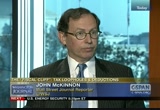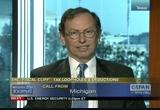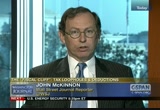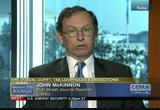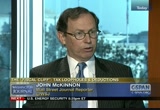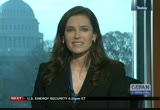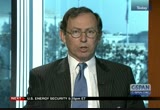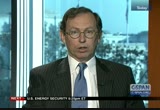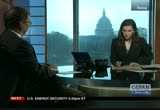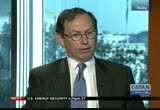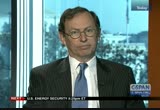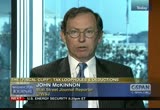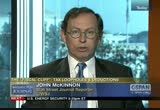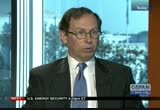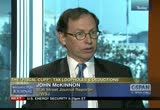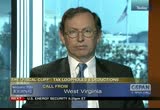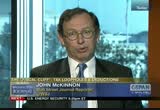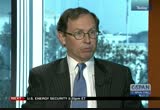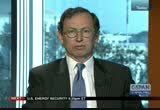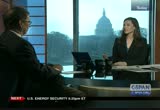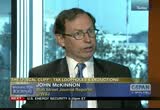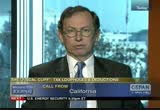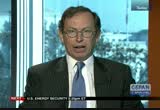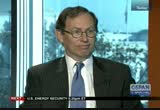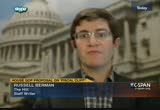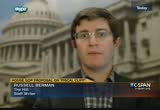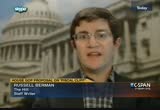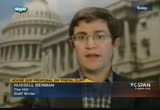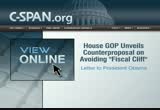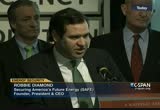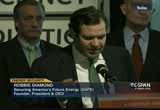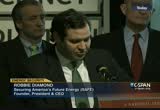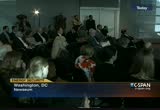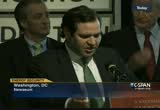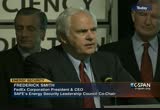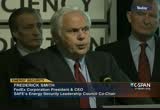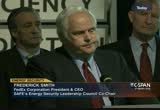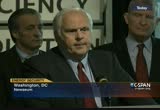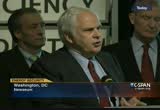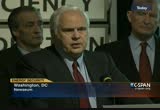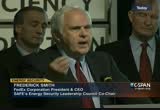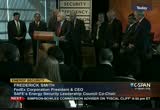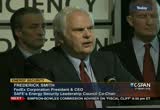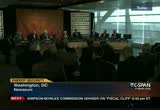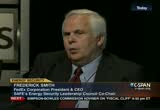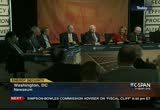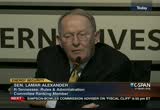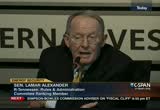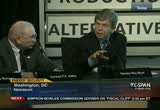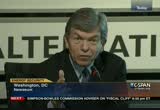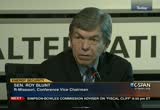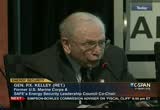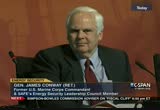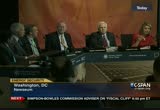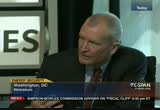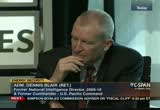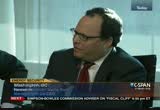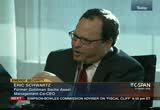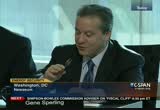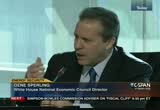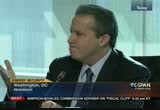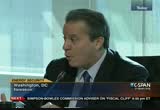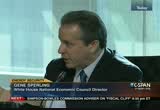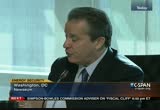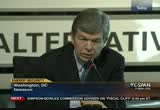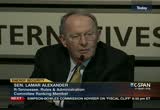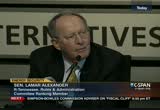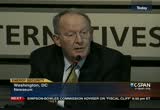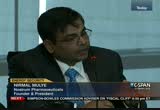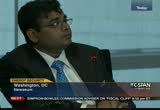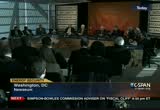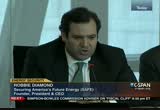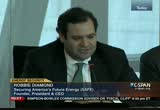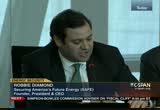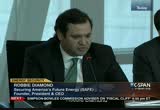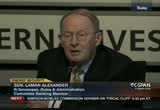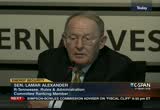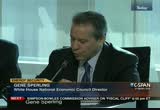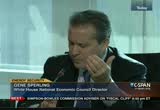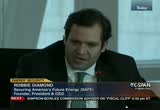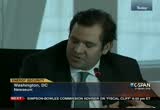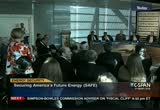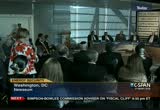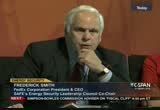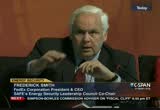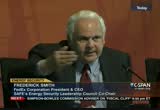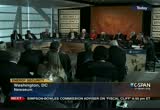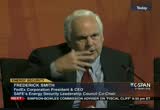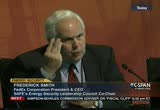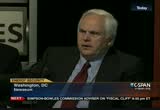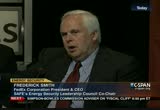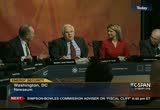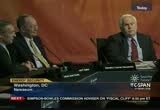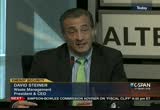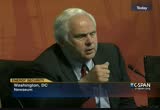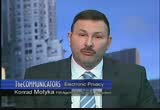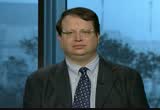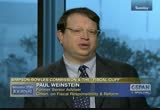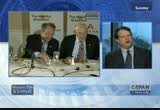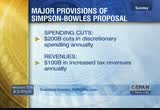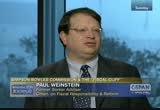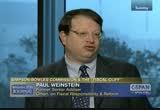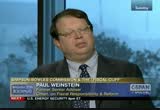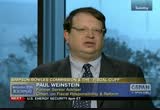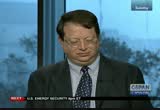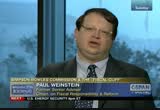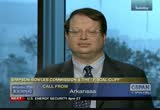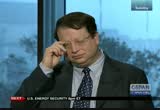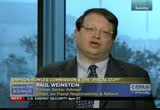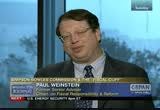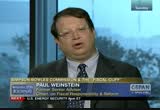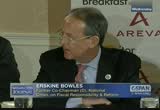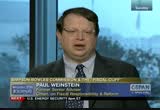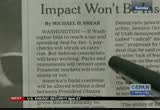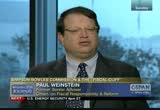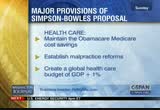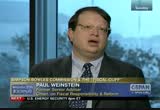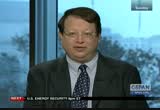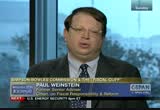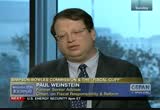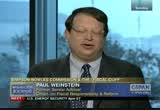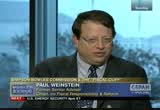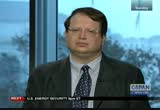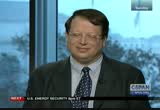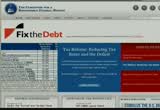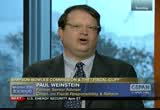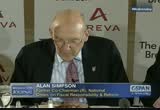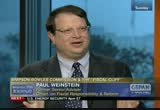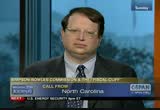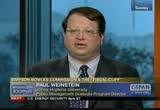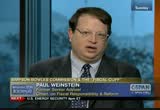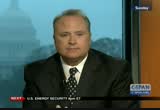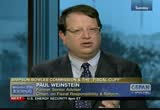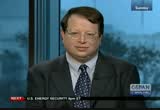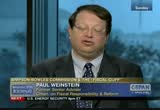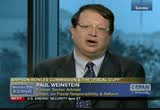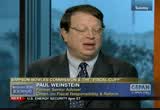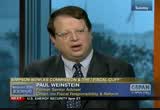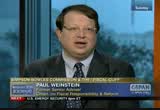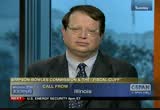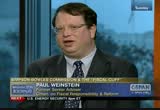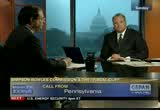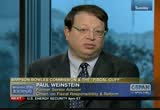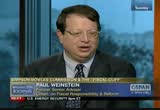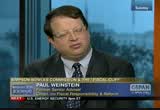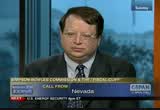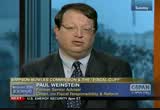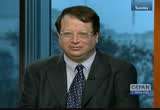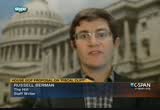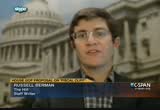tv Public Affairs CSPAN December 3, 2012 5:00pm-8:00pm EST
quote
5:00 pm
there is debate lobbying
5:01 pm
air. please ask mr.
5:02 pm
the focus of this effort to reduce deficits now is on getting them, in the federal budget deficit to the range of 3% or so. that is what i mean when i say policymakers are not trying to get rid of the budget deficits. given the economic weakness, a little bit of deficit spending is probably not a terrible thing, at least in the eyes of some budget economists. i think there would be comfort in washington around 3% of gdp. getting there is a big challenge. there are problems with medicare and social security. they are facing big deficit situations.
5:03 pm
host: what motivates the creation of deductions? what about the other incentives? mortgage deduction it to encourage people to buy a home. guest: some of the deductions have been around forever, since the invention of the income tax. there has always been a deduction for interest that you paid. the government didn't think it could distinguish between mortgage interest and other kinds of interest. less interest is deductible now. some of the things are left over from the early days of the tax code. there is no magic about allowing people to deduct mortgage interest and not the interest they pay on their credit cards. some of these things are hard to explain.
5:04 pm
host: does it incentivize home buying? guest: it does provide some if incentive for buying a home and is a large tax break and gives them an enormous benefits. it mostly provides an incentive for buying a bigger house. it seems to incentivize mcmansions. there is a fair question of whether that is something we should be spending that much money on. host: let's go to ohio, robert is a democrat. caller: yes, my question is
5:05 pm
this. a question/comment. i have seen all these outbreaks been giving out. supposedly they were created for an incentive for them to hire more people. they were given as four years and years. a majority of these companies did very little in hiring. they say they still need to do this. why should we continue giving these tax breaks to these companies that are not following through with what they were supposed to do when it comes to hiring?
5:06 pm
guest: that is a good and a very hard question. there are lots of different factors that go into a company's decision to hire or not to hire. a bit short term problem we face is the huge uncertainty that exists over what is going to happen on tax policy. more and more of the tax system has been put on a short-term basis. we face these big fiscal challenges -- congress would like to extend these tax breaks but there is not the money in the budget to do that. one of the biggest positive would be to get the tax bases on a positive footing and businesses would have more certainty going forward about what their own budget situation would be. that would allow them to make better decisions about hiring.
5:07 pm
5:08 pm
5:09 pm
common deductions. guest: it is a very big deduction, and a lot of people give a lot of money to charity. heartwarming features of what can be a clinical area of coverage. but as i mentioned earlier, i am constantly impressed at how much a lot of people give, including those at the lower end of the income spectrum in particular. it is an extremely sensitive area for members of congress and for policymakers. i would not be surprised in the end if congress does much, if anything, to limit the availability of deductions for charitable contributions because it is so important to so many charities. and it is also something that you want to incentivize, i think, if you're a politician.
5:10 pm
host: and in the op-ed pages of the "washington post" writing about how terrible the -- donations are factoring in to the tax rate. and he talks about how a lot of industries are talking about how their deduction is the most important and should be preserved. let's hear from bill in kentucky, a republican. good morning. caller: i am a 67-year-old senior. i would like to know why when they talk about obamacare, they are all talking about why it hurts business.
5:11 pm
but the people under $60,000, when that mandate goes into effect in 2014, there are those that are going to be heard. it is the lower and middle income that will be hurt by that. and this 2% social security and raise, everybody knows that social security is based on what you paid into it. when you pay 2% less into your social security retirement, five years down the road, these people 55 and up, their social security will be cut about $80 a month. a $100,000 per year person will
5:12 pm
be cut even more. all because of this payroll tax cut out of your paycheck. that is not a payroll tax cut. that is a cut from social security in 2010 and in 2012. no one is addressing these issues. host: we will get a response from john mckinnon. but first of all, do you have any loopholes that you take advantage of? caller: i am a senior and i pay taxes on my social security and my pension. host: did you ever take a deduction for owning your own home or anything like that? caller: i don't own a home. host: ok, thanks. guest: he makes an interesting point. when obamacare is taking effect in the next few years, and there is a lot of uncertainty among businesses, small businesses in particular, that feel they are facing an expensive mandate to provide health care coverage to their workers. they feel there is a backup system is being put in place to provide coverage to those workers and other folks who are not able to get coverage in the workplace.
5:13 pm
there's a lot of uncertainty among businesses in particular about how it is going to affect them. that is part of the overall of the business community. if you are concerned about the burden that is going to create for individuals, i think that is really less of a concern, and particularly for those getting older. it is really not a concern at all. medicare is still going to be there for older americans. no one is going to propose to get rid of it, although they do want to modify it. as to the changing rate on social security, that is of concern to many in washington. many were very uncomfortable with this percentage break, because if the money is supposed to go into the social security trust fund and is not really going in there, congress said in a law that they would
5:14 pm
pay that money back in a trust fund. but there is suspicion on whether that is rarely ever going to happen. that feeds into their concern about what will happen to social security. is it going to be changed in ways that affect the benefits? host: all of the calls to simplify the tax code, to streamline it, and that may certainly mean to itemize the credits of that take place on the tax returns. guest: the complexity of the tax system is a huge problem. everyone from the irs on down to congress and the industry out there, if you will, the financial accounting industry, everyone recognizes is an enormous problem and causes people to pay a lot more than they otherwise would.
5:15 pm
most people do not do their own taxes anymore because they are so complex. they rely on software that is kind of a black box. it is hard to know how the tax system works anymore. people do not have as much of an incentive to take a deduction if they do not know it is there. and the software is what they are depending on. host: does simplifying the tax code as necessarily mean lessening the deductions, cutting some of them out? guest: yes, it would. inevitably complex dealing with the complexity of the tax
5:16 pm
system would mean getting rid of a lot of the deductions. frankly, it may be so complex that it cannot be simplified in a meaningful way. host: let's hear from morgantown, va., independent caller. caller: i am a college student. my peers, we do not see a big difference between the democrat party or the republican party that would make a big difference. i think the democrat party needs to push the president, or the democrat party to make these changes in the loopholes. for the top 1%.
5:17 pm
i just don't see any changes from the fiscal cliff that is coming up. guest: i think there are big changes coming up. i think the president has drawn a line in the sand and let republicans know he has no intention of allowing the tax rates for the wealthiest americans to be extended again. they were extended in 2010, but i feel there is a new resolve on the part of the white house to not let that happen again. i'm not sure if all the rates will be increased as much as the president would like. it could be that they get bumped up by a point or two, instead of the 45 that he wants to increase them by. -- four or five that he wants to increase them by. if nothing changes, then tax rates go up for everybody, which would be a very big change, but i do not think that is going to happen.
5:18 pm
host: here is a tweet. christian churches are not the only ones affected by deductions. holiday donations, how is that factoring into the fiscal cliff? is there anything going on that's give them more of an argument? are they coming to washington like everyone else to have their point of view heard it? guest: yes, they are lobbying hard to protect the important reduction that they now have for charitable contributions. -- deduction that they our out for charitable contributions. i do not think that this will get resolved finally just in the next three or four weeks. the timing is something that they are working, like everybody else is. they are certainly arguing that
5:19 pm
this is a big moment and they do not want to lose their deduction now. but as i said earlier, i think a lot of these deductions will be made over a time of a year or so. this fight go on. host: maryland, democrats line. go ahead. caller: thank you for letting me speak on your show this morning. i just want to make a statement about the tax reform. it is not really going to hurt the stock market. it is just going to affect the economy the same as gas prices or food prices going up on the poor and middle class. life will go on. just like life has gone on for the rest of the united states of america. but right now, i think the state of politics is very sad
5:20 pm
because they're seen -- there seems to be more of a game to be played and positions, one party having the upper hand over the other. not much is going to get done. and you have too many extremes on each side to make things a lot more difficult to run. and it makes it difficult on the president as well. i'm optimistic that the president got reelected, but pessimistic on anything really changing. have leased, anytime soon. -- at least, any time soon. host: and talking about actual change, if there will be a difference on january 1st or otherwise, in terms of taxes, politics, the fiscal cliff, john mckinnon, are any of these
5:21 pm
expiring? as part of our fiscal cliff series, we're looking at the bush tax cuts that are set to expire unless congress acts, and we are looking at spending cuts. our deductions on the chopping block unless congress acts? are they floating through unless they get rid of them? guest: by and large, most of them are permanent features of the tax code. yes, the bush tax cuts include a lot of tax breaks, particularly for the wealthy. the capital gains and dividends what -- rates would go up. there are other breaks for the wealthy that would go away if we go over the cliff. there are also some breaks that would benefit working class americans. the child credit is the biggest example. also, there is relief from what is known as the marriage penalty.
5:22 pm
this is a quirk in the tax system that causes people to pay what many believe is an unfair break just because they are married. the relief from the marriage penalty would go away and the child credit would go from $1,000 back to $500. that would have a significant impact on just regular working folks. host: jason joins us from rancho cordova, calif.. and republican caller, go ahead. caller: four quick comments. number one, we are talking about bill gates and warren buffett and driving some kind of benefit by setting up these trusts. most of the people do this because they give all of their money away to charities and they know that this money, if left after their death, it will
5:23 pm
be taken over by the government and most like the squandered. most of the money by these wealthy people is given away to people, to charity and to people that can really use it. i think they should be given some credit for that. number two, they keep talking about the wealthy and the middle class. the wealthy people in this country, like carnegie, henry ford, john rockefeller, to me, they are responsible for creating the middle class. the middle class did not really exist before people like that came and created these big corporations and created the jobs that put america and where it was. host: we are just about out of time. but before we let you go, do you take deductions on your taxes? caller: of course. host: let's go to john mckinnon and get a response. guest: i think you're making a valid point overall.
5:24 pm
havenk that's some people criticized warren buffett in particular for advocating a a higher taxes on the wealthy when as you point out, he is very busy giving away a lot of his wealth to a foundation that is going to spend it instead of the government spending it after he passes away. i think that is a fair point to make. it points out the real importance of the deduction for charitable contributions, and just what a phenomenal source of benefits that is for foundations and private charities. host: john mckinnon is a reporter for the "wall street journal." he has been covering fiscal policy since 1999. prior to that, he was with the
5:25 pm
journal in florida as a reporter based in tallahassee. thanks for talking with us. >> and on tomorrow morning's "washington journal", tom cole discusses the latest in the fiscal of negotiations. and then georgetown university law professor john buckley looks of the history of the alternative minimum tax and how it is being dealt with in negotiations. plus, your tweets, phone calls and e-mails. that is live tomorrow morning on "washington journal" on c-span. a closed-door briefing earlier today to outline the proposal of president obama for the so- called fiscal cliff.
5:26 pm
what is the proposal? >> the top line #would be about $2.20 trillion in the budget control act. and they say compared to what the white house put out, the white house says it offers $4 trillion when using the same accounting as the white house, it would be about $4.60 trillion over 10 years. republicans say it would come from tax reform, but not to increasing tax rates. that has been a sticking point thus far in negotiations. >> you are talking about the bush tax rates? >> all of the bush era tax rates would be extended into next year and that would start the process for tax reform. it would be in the tax reform process that there would generate -- and they would
5:27 pm
generate $800 million -- $800 billion in revenue. and they say the $800 billion could be raised without raising tax rates, and this is something that is in dispute with the white house. the white house said there would be no deal unless republicans agreed to increase tax rates on the wall the next year. >> what do the republicans say about the debt limit, sequestration, automatic spending cuts, and changes to entitlement programs. -- entitlement programs? >> that was not addressed. the white house offered to make permanent the changes. republicans are not proposing to raise the debt limit at all. but if you ask their aides, they told us that the speaker would be open to increasing the debt
5:28 pm
limit, but he is sticking by his role that any increase must be accompanied by cuts and/or reforms. it could be on the table. entitlements, they are not laying out this was a big changes to medicare and medicaid. what they are saying is they want the $600 billion in health savings. they mentioned things that had been mentioned for about a year- and-a-half. including way in the eligibility age -- waving the eligibility age for medicare from 65 to 67. and the wealthy will either pay more premiums, or receive less in that if it's a ban to other american -- in benefits that
5:29 pm
other americans. the only change to social security that they're proposing is something that has come up repeatedly in these negotiations, which is a change to the way the benefits year over year are calculated. changes to the way inflation is calculated and the way that would reflect the social security, medicare, and a range of other policies. that is something that liberals have not opposed. it has been broached often in these negotiations. >> what is the gop presenting for spending cuts? gregg's that is not something they are specifically offering. the sequestered about 10 years and $1.20 trillion. they are offering $2 trillion in the next 10 years. everybody is talking about the way to replace the sequester is to find alternative cuts and
5:30 pm
other reforms that would equal or exceed that $1.20 trillion. republicans are pretty much presuming that this offer, if accepted, the sequester would also be eliminated at the same time. >> house republicans given any ground based on this proposal? >> it is essentially overturned. it is very similar to what erskine bowles, the former clinton chief of staff, who was the co-leader of the simpson- bowles commission, separate from that commission, mr. bowles testified before the super committee last year and testified at that time. republicans say that their current model is modeled after that offer. the simpson-bowles model has gone on lot of talk in the last two years. it is proposed on democrats in
5:31 pm
these discussions. on the revenue side, but $800 billion that they are offering, that is the same of what speaker john vader, offered the president in their negotiations -- speaker john boehner offered the president in their negotiations in 2011. the white house has consistently signaled a loss of of weeks that they will not accept any deal that keeps tax rates for the wealthy. >> russell burma is a staff writer for the hill. thank you. >> thank you. >> and you can go to our website c-span.org to read the letter that the president wrote to house rubble can survey. it was signed by house speaker john vader, majority leader eric cantor, and four others.
5:32 pm
a group of retired military officers and business leaders recently released a report outlining ways to decrease u.s. dependence on oil. the group today posted eighth discussion on oil independence. among the speakers, the senior -- the ceo of a and fedex, a white house adviser, and senators. >> a good morning, everyone. i especially want to thank members of the security council. they have been a distinguished group of members since 2006. i also want to give a special thanks to -- >> i want to give a
5:33 pm
special thanks to the staff at securing america's future energy. we stand on the shoulders and the time it takes to get these reports. the policy staff, james, leslie, the staff that puts these together, our political staff and the rest of the team at safe. we're seeing more production than we have ever seen before. the most production in the last couple of decades of year on year growth. oil imports are falling. the demand for oil continues to decline based on fuel economy standards and other reasons. we still continue to have a problem. the report we are releasing today and the subtitle says it
5:34 pm
all. harnessing american resources and innovation. how do we leverage this abundance we have in the united states to our maximum benefit? washington is talking about our fiscal crisis. the relationship of our oil needs to this crisis are close. it is unnecessary ingredients. every recession in modern times has been preceded by oil price hike. we can cut all we want and raise revenue, we will never find a way to solve our fiscal troubles. how do we leverage this great abundance in the united states of for resources and our skills to help the country through these times and put us on a good footing for the next 50 or 100 years.
5:35 pm
i think this report is the beginning of a process of creating an effective and stable bipartisan consensus on energy policy. everything is about the zero sum game in this town. we see oil security as a unifying vision where people do not have to compromise their core principles. the environmental community can see a reduction in the amount of carbon and an improvement in the environment as well as conservatives can see the idea of leaving it more resources at home and sending less of our wealth abroad. this is a way of doing something different, which is creating a consensus to get something done in the next congress.
5:36 pm
we are excited for the next congress and to work with all legislators to implement these recommendations and see them through to their felon. -- to their fulfillment. i would like to call fred smith, the chairman and founder of fedex. he really needs no introduction. but the truth is fedex and what -- p. burns about 1.5000 gallons of fuel per day -- 1.5 billion gallons of fuel per day. oh, per year. [laughter] why would really be a problem. but the truth is that sex, what
5:37 pm
they have done in our economy is groundbreaking. they are the clipper ships of the modern age. what they see in terms of the economic growth of our country, because they touch every industry, as well as providing the transportation to making our economy grow, i think he is well-suited to discuss this issue. i thank him for being the co- chair since 2006 and joining with general kelley and myself to do this. thank you. [applause] >> thank you. i became involved in the council out of self-interest. because of the energy intensity of fedex which operates almost 700 airplanes. i was recruited to this endeavor by air chairman, p.x. kelley, who pointed out to me when i first came aboard this effort that after nuclear proliferation and terrorism, our dependence on imported petroleum was our largest single national security issue.
5:38 pm
5:39 pm
we have been involved in the middle east in the past quarter-century and three shooting wars and a great tragedy for our country were the young lives lost and the treasury expanded and the foreign relations issued that it has engendered. all roads lead back to this dependence on imported petroleum. in 2005, we were importing about 60% of our daily petroleum needs. we had about 20 million barrels a day usage in this country.
5:40 pm
today we're down to about 40% in terms of our petroleum usage per day being imported. we are still spending about $60 billion a month to import that petroleum. this problem has been going on since 1973. every single economic contraction this country has had including the financial meltdown in 2008 was precipitated by run- up in oil prices. the marginal barrel of production is controlled by the opec cartel, meets twice a year to establish quotas in order to keep prices at an acceptable level for the opec exporters. the national oil companies of opec and other countries around the world hold the vast majority of oil reserves. they produced only about 40% of the world petroleum every day. there's a chart that shows this graphically.
5:41 pm
if there is ever an example of a market that is not free, it is that. nobody acts in that matter in a purely free-market. if opec were doing what it does abroad in this country, it would be a crime and in violation of our antitrust laws. the prescription that the council, but several years ago which was very impact will in the energy security independence act of 2007, was it, was based on our port of 2007, which said that the united states should maximize its oil and gas production, that it
5:42 pm
should significantly reduce consumption and improve conservation, which led to the direct support for the reinstitution of fuel efficiency standards, which has not been done for 20 years. and to develop to the extent it was liable a biofuel substitute for petroleum. this new report we are releasing today continues these themes with a couple of important caveat. the fantastic revolution that is taking place since our original report and are intermittent reports by the so- called fracking revolution for oil and gas.
5:43 pm
the significant improvement in national efficiency that has been brought about by technology and the new fuel efficiency standards that were enacted by the bush administration and were increased by the obama administration. the report is not political in any way shape or form. it endorses things that are supported by the right in some cases and that are supported by people on the left. you cannot just take the parts that you like. you have to take the holistic approach, to maximize u.s. production and to reduce consumption partly by diversifying our transportation sector away from petroleum.
5:44 pm
the last thing i will say is that petroleum use in transportation is the pivot point of this entire problem. 70% of our use of petroleum in this country is for transportation. transportation is fueled about 93% of the time by petroleum. if you want to reduce the united states' dependence on imported petroleum and the related geopolitical issues, particularly in an issue when rising demand is creating a potential conflict for these resources, then you have to recognize transportation has to be diversified away from petroleum or the prices are set on the world market. canada and norway have been net petroleum exporters but they pay the same market price for a
5:45 pm
gallon of gasoline as we do. so you must diversify and that includes light duty trucks and the adoption of natural gas in its liquified or compressed form for heavy-duty vehicles like refuse trucks. if the recommendations are adopted, the united states has the potential to reduce our dependence on imported petroleum and thereby our national -- reduce our national security risk to improve our balance of payments and about half remains petroleum. and to increase our gdp by the maximization of these activities in the united states rather than exporting our dollars abroad. thank you very much. think we can sit down now.
5:46 pm
5:47 pm
good morning, everyone. i'm in lazy moderator. want to talk about this report, talk about the future of energy in this country and the future of transportation. i want to make sure you know to please jump in. i don't want to ask a question and ask another question. do we all agree? wonderful. let me start with fred. we have heard about this new found or renewed abundance for energy.
5:48 pm
i have heard people this week, saudi america. we have all this energy. how do we leverage it and harness it? >> it is important to take the hyperbole of comments like america being the new saudi arabia of energy and put it in perspective. we're burning about 18.7 billions of liquid fuels today. we produce after an incredible increase of domestic production about 6.5 billion barrels of oil per day. when you take biofuels and the natural gas liquids, it is about 9 million barrels per day.
5:49 pm
we are still importing an enormous amount of petroleum. the first thing about our recommendation is to maximize u.s. oil and gas production everywhere, in alaska, offshore, it is coast, west coast, gulf coast, in new york, pennsylvania, in the eagle ford areas. that has enormous implications in terms of gdp growth. because of the enormity of the issue, you have to continue to reduce demand. >> what role should the government play in the future -- your business is in transportation, too -- we are
5:50 pm
mired in conversations about the government play in the future f. we are talking about long-term infrastructure, a long term energy plan. >> this is the perfect opportunity for the government to work together to achieve a common goal. there is plenty of times when our interest might not call last with the interest of either of -- might not coalesce with the interest of either of the parties. this is the opportunity we have never had before. you could have consumer, business, and the government's all working together to take advantage of this huge resource. for us, it makes so much sense because it makes business sense. we get about $1.65 a quilt when
5:51 pm
-- the equivalent with natural gas. from the government point of view, everybody is talking about jobs and the fiscal cliff. everyone talks about taxes and what is going to happen with the fiscal cliff. there has been $1500 gone to increase oil prices. you can get them that tax cut today if you invested in our report. everybody talks about entitlements. high oil prices make the social security trust insolvent five years sooner than they would if he did not have high oil prices. america needs jobs and growth.
5:52 pm
following the recommendations in our report will lead to both of those. it would be good for american business. >> i will start with senator alexander. tell me about energy policy and where it fits in with the fiscal cliff. what we will spend money on and how we were tightened our belts. >> the major place it fits is the right policy would create an environment which would produce a lot more revenue. that would help to reduce the debt. the federal government doesn't spend much money on energy. energy research is about $6
5:53 pm
billion a year. i would like to see it doubled. this report is a blueprint for independence and i think it is the right blueprint. we are not in a position to be held hostage by anybody. it also focuses on find more and use less. what we can do in the federal government is i think invest in research and getting a 500-mile battery for electric cars and getting solar energy that is 1 kilowatt installed and finding a way to capture carbon from coal plants that can be turned into fuel that is commercially sold. we should look at the model of unconventional gas in terms of how our system and federal
5:54 pm
research and our system of private properties have produced a situation where we have a massive advantage over europe and asia in terms of our natural gas. it creates a better economy and that reduces the debt. >> there is a headline predicting we will be producing more oil than saudi arabia beginning in 2020. this is something almost on imagined 10 years ago. what is the role of the federal government? >> to do things that encouraged the results. you can solve this fiscal problem if you grow our role to position relative to everybody
5:55 pm
else's. a big problem is the percentage of government spending is more than its should be related to total gdp. if there is an easier for millet -- and easier formula in the history of economics that more american energy equals more american jobs, i don't know what it is. it is all the jobs you have if you of a reliable supply of energy. the front page of the "the wall street journal" indicates a difficulty of connecting this cheap product we have in natural gas. we thought we would run out natural-gas as a country. connecting this cheap product with a more expensive market and getting it overseas. if we could become energy self-
5:56 pm
sufficient, that does not mean we would not buy on the world market, but if we could meet our needs in the north american markets, almost all of that money comes back to us. we have no better trading partner than canada. nafta has increased the trading capacity of mexico. it has gone somewhere from the 40% range and a growing and, catching up with canada. when you buy energy in north america, they give you the money back. that was a lot to solve the problems. if you make your position better as a nation, suddenly, your numbers begin to where they need to be relative to the rest
5:57 pm
of the economy. >> you said this is one of the most important issues facing america. why do you think it is such an important issue? >> transportation and the availability, the means to get there, what we do with it, it is without a question in my mind, being a marine and an infantry officer, it is the most important problem facing the united states for several reasons. first, i do not believe that the american public truly understands the transportation in the availability of the resources to solve the problem. i think we need an education program by learned united state, such as those in this audience to help us in getting this word out to america.
5:58 pm
i think it is essential because it is coming on very fast. there are things that are happening that we take for granted. as an example, we take for granted the fact that we can move thousands and thousands of marines, sailors, soldiers and have the equipment without any burden to carry economy, not true. the truth of the matter is is a tremendous burden to our economy to have a national- security policy that defends the country that we love so much. without having the ability and willingness to get out and give the american public forums such as this in helping giving us answers to some of the very difficult questions that they ask, i want to take this opportunity to think robby for what he does. i met him some years ago when he found my office in an office
5:59 pm
building. he came in and we had a chat and i said, my goodness, this fellow knows what he is talking about and he has never disappointed me whatsoever. what we need to do is explain to the american public things such as the fact that you cannot move thousands of troops and their equipment down all the other things that go along with it free of charge. it has a price tag that is quite large, but it is in the best interests of the united states. to answer your question, i think we need a very cultured energy policy that we, the people in>> thank you.
6:00 pm
you are passionate about this subject, i can tell. let's talk more about the military. you talk about moving people and machinery. there are some of the other esteemed leaders of america's military here. what about american national interests in other parts of the world? and general conway, how does that change if we have an abundance of energy that we are able to harness in this country? >> it changes it. i would say my sense is that we are on a long drive. as opposed to grasping in the dark as we may have thought of 10 years ago, we are driving into sunlight.
6:01 pm
as has been pointed out, we still depend on foreign sources for about 40% of our energy requirements. in my mind, that still creates a critical vulnerability, maybe even a central gravity. 2013 will be a very interesting year and it will be a long time before we are totally energy dependent. to your question and, i think we need to be conscious of what decisions we can make as a nation. today, our economy as much more consideration on the part of great military minds than ever before. as we look to give it to the pacific for good and just reasons, we do so with full knowledge that we get our primary raw resource from the middle east, from africa, from the americas, and to a lesser degree, from europe. we need to be conscious of what the requirement is as we make military decisions. this vulnerability you we will phase, i believe we will for some time. we also have an economic competitor and a partner in
6:02 pm
china. they have a voracious appetite for natural resources and we're looking at new ways to get these in our own backyard, and maybe i will ask you this question, admiral. how important is the china factor in america energy program's going forward? >> i will talk to doubt, but i would like to mention a few puffs things about this report that may not have come out in your opening remarks. we definitely advocating opening of drilling in the united states where we cannot, but there is a very strong part of this report that says it has to be done safely and we know how to do it safely. that is one contribution of those of us who have served in the armed forces, we do a lot of dangerous stuff in the armed forces, fuel, nuclear power, explosives. the way we do that safely is a
6:03 pm
high standards, rigid enforcement, and very professional inspectors to do it. we strongly recommend applying this model to regulatory body so that we can do this safely, so that we can do oil retractions safely. that we can do safely. the general and i live in pennsylvania and we want our water to be drinkable, our streams usable, but we believe firmly that can be done if you enforce these standards. the second thing is that we do advocate a federal role and a non-pre-market to try to open up possibilities to this country for more different kinds of energy, but we are definitely concentrating on creating the conditions part of this.
6:04 pm
we are not talking about creating winners and losers in developed industries. upre talking about opening to alternatives to today's petroleum based internal combustion engines so that we reduce our national security dependence on the oil that is coming from, in many cases, unstable countries and also regimes that do not wish us well, and quite the opposite. china and india are causing the trend that will drive the cost of petroleum up, so no matter what we do, the balance of payments is worse, so from the economic point of view, it is china's role as they seek to achieve wealth and prosperity, which they want and which we
6:05 pm
want them to have that causes us to look elsewhere for these alternatives so that we are not hurt by their success but we have alternatives for ourselves. >> can i have you weigh in on the importance for how these new trends in energy production may change where we are acting in what we're doing in the rest of the world? >> there is a lot of talk about if this will change our focus in the middle east, but countries that are self-sufficient still pay the same market price than the world market, so that will not change. i think we will still have an interest in the middle east and we will still have some emphasis there but it gives us more leverage, better options. it improves our flexibility, of this rebalancing of our national security policies in the pacific, an area where we need to pay closer attention that i hope can be done in a constructive way of as we
6:06 pm
develop our relationship with china. i think it gives us more flexibility, leverage, options and it hopes with resilience. overall, the foundation of military power, no matter how great and good we are, the bedrock, the thing we build our national security leverage on is a well functioning economy. we need to show the world we can get our economy under control, reduce the deficit, and begin to show leadership in various areas of new technology that demonstrated here to the rest of the world. kohl will always be there. there's lots of work there.
6:07 pm
all the sales will help, i think, of leverage our capability and give us more options. >> let me bring you in. 92% of american transportation is run on petroleum. with this new landscape for energy production of, how are we doing on diversifying different kinds of things that are running our transportation? >> so far, it is going slow. something that was deeply focused on was something note senator alexander said earlier. we need to find more and use less. i think you're asking about the use less part. the extension of the changing fuel efficiency standards was one thing, but we believe fervently in the need to
6:08 pm
diversify away from using petroleum for transportation and given that it represents 70% of our use of petroleum to begin with. with the change in technology and the access to so much homegrown natural gas, we can use that and we can also use the development of electricity and its usability in automobiles and light trucks. >> what about the role of the government? find more coming years last, and someone has to make sure we are not doing dangerous things, as the admiral pointed out. >> i am a private sector guy, and i believe in the application of private and free markets for the development of our country, but there are times it is clear when the government has an unfortunate role to play.
6:09 pm
in fred's introductory comments, the argument was very clear. the market for oil, on which we depend, is not a free market. the only way we can respond to that is an activist approach. that does not mean it has to be very expensive, but we need to develop a coherent policy. the fact that are recommended proposals are supported by people typically on the right side of the dial and others are typically supported by the left should suggest to you that this is not an ideological game. this is about trying to come up with a set of proposals that are good for our country overall. the lack of ideological support should be viewed as a positive. >> ways to see you. >> thanks. i apologize for the fact that i do not control my life for scheduled to much.
6:10 pm
>> nothing going on in your world. now that we have brought you from the edge of the fiscal cliff, let's talk about these for a moment. you have seen the headlines that say, saudi america. we have this new found richness, new technologies to find energy. i have seen some estimates up to 3 million new jobs directly related to the energy boom. is it real? how unfortunate of a driver will that be for the economy? when you're sitting down trying to figure out what growth will look like in this country, how does a factor in? >> in a few ways. number one, if there's one thing i feel more optimistic than i did one decade ago, i had a book out around 2006 and i felt like, when you are out making the case for why there
6:11 pm
should be more location as opposed to china and india, you felt like you how the wind in your face. you have great meetings but then they pull your side and say, that's a powerful argument, but we're moving this to bangalor next week. there is much more of an economic case for people to be relocating and bring jobs back. some of that is about the way it is structured between us and china and some of it is energy. no doubt the future of natural gas is just making the price calculation more attractive to someone thinking about a new location and, in a planned of being in the united states.
6:12 pm
energy, the lower cost a promised natural-gas is a promised economic factor in location decisions making it more competitive. that point was driven less by democrats and republicans and really the consulting community making this case to their clients and that is now getting out. i think that is one thing. secondly, as we have seen, and others would say, we are not dependent on foreign oil as much as the global oil markets. when oil markets are volatile, it brings in volatility to our economy. we felt it both in 2011 and an 2012. buchanan prevented, but to have
6:13 pm
the volatility have such an impact, we were fortunate. we put in a payroll tax cut that would cushion people's consumer spending a bit, but when you are in a tenuous time, as we has been the, the fact that the volatility can have such an effect on consumer confidence, we all know that americans are over affected by consumer confidence factors. they are bothered by sudden spikes in gasoline prices more than economics tell you that
6:14 pm
they should be. and, obviously, jobs related to the actual increase in oil and natural gas production and have an industry is based off of alternative fuels, a think that is all very productive. one thing i want to say since we are in this time where no one seems to be getting along is that, one place where i see a real bipartisan agreement, they have an excellent bill on electric vehicles where they have an idea that maybe you have already talked about, but i believe so much in that type of thing. to be able to show something working somewhere from the first time 60 minutes or cnn and is able to do a story where you show a community where it is easy and the incentives are there two years on alternative vehicle, i know what will happen. every mayor will see that, really the people come and say, why cannot we do this? having this deployment community proposal that senator blogged and alexander have as, i think, the type of thing you have to do to create momentum. you have to show success and usability. you look at that in the 54.5% goal by 2025 in there, and i think that creates real momentum. all of these things are good for certainty, good for bringing jobs back, and creating economic activity as this becomes the place to not only explore and their research on but the ploy alternative vehicles and alternative vehicle technology. >> i will seize on that with the bipartisanship because we will not smell that in the next three weeks. let's talk about the deployment
6:15 pm
idea. >> the idea is for the government to help create models to see what works and how it can work. i think he said it very well. you have the story about how this community is responding to this infrastructure that makes it easier to have an electric car or natural gas-powered car and you see what happens. senator brown alexander has been a real leader in this and he even has an electric car. he is going the distance here, walking the walk. that's the kind of thing government can do. government can do a lot on the regulatory side to slow things
6:16 pm
down if you forget to have effective cost-benefit analysis, but it can do a lot on the project side to really find something that works and the community becomes the laboratory for change and that others can then model. you do not have to do it everywhere and if you can show in water to a location that there really work. that is the driving force behind the idea of that lamar has been a significant spokesperson for. >> do like that car? >> i do like it. i have driven my leaf. i live in this building in a plug in the wall when i go home at night. that's all i have to do. deployment communities are a good idea. sometimes the government can have a demonstration project that makes a difference. they did a hydraulic factory and we have had fracking are around forever. three things made a difference
6:17 pm
in it. one was a huge to demonstrate that you could do it in a big way which was helpful. the second was the laboratory inventing 3d mapping. it was the entrepreneurs and the people who was the land that made the difference. iolite the deployment communities, but i prefer research and development. i take the $14 billion and we would spend on windmills and put it on energy research. that's a mature technology, but if you want to sell a lot of those lef's the key is to get the cost from $30,000 down to $20,000 and the key would be a 500,000 mile battery. this little agency in the department of energy has a research project that they are funding which is a double the density of lithium batteries for cars.
6:18 pm
that's exactly where we ought to go. they would also have a project to turn a microbe into commercial fuel. and that would work, that's the holy grail of energy. it is also working on solar power and $1 per kilowatt installed. that's precisely what we should do and does not cost much in federal money. we spend $6 billion per year on energy research. we could double that over five years on those kinds of projects and i think you would be the
6:19 pm
most voluble thing we could do which is perfectly consistent with many of the recommendations in this report. >> we will take some questions from the audience, but i wanted to make sure everyone got a chance to weigh in on what you think the role government should be. companies, governments, and citizens in trying to figure out a national problem. >> hello, thank you. the government needs to recognize that for us to be economically competitive, we need a reliable and economic source of energy. the four alternatives are available, which are economic and reliable, we have to make sure the resources are economical. yes, we can increase the oil production and, but if we maintain a free market, the
6:20 pm
prices will depend on global pricing. one more point i would like to make regarding conventional energy, the history of the internal combustion engine, we are spending a 15% less and there is a huge amount of improvement that is possible. of that improvement happens, which i'm confident that it will, it will attack the problem at the root, where we're using a lot less oil and creating less carbon dioxide. the federal government recognizes that the internal combustion engine is going to power in the near future or the medium future, the alternatives will be ready for prime time and that would be helpful economically house well. >> whenever time of transition we make in how we power the
6:21 pm
country or powered transportation, it's going to take a long time. there's no reason for that to be painful if we can bridge that -- but how long it will take people to replace the vehicles they have now, whether new camry for that replacement or not and what you can do, but just realistic understanding that if we knew what was going replace the internal combustion engine for transportation and, it will be decades before every family in america got there and that is probably the right way to do it. understanding that and reliable, dependable -- something you know will be there, it allows your economy to grow in unbelievable ways. we have a potential here to really launch our economy in a way that not only helps us but helps the whole world who will
6:22 pm
anchor around a strong and growing u.s. economy and they all know it. there is no country in the world for the people in charge do not understand that they benefit from a strong, dependable, secure u.s. economy and energy is the key, i think. >> christine, can i just say something here? i think one program we have done in securing american pricing energy and is something of note that many of us have seen. i think it speaks to several key messages. just as we did in 2005, they're just as relevant today when we were importing 60% vs. 40% and continuing to go down. they also fall along what senator blunt said house well. but you see from when we have the oil crisis, there is no such thing as energy independence. some fear we define the problem as energy independence and it is all about imported oil.
6:23 pm
but then we solve a problem. we have been saying we needed to end our dependence on foreign oil, but the truth is we have a dependence on oil and any thing that happens anywhere in the world affects us here. if we miss diagnose the problem, we come up with the wrong solution. at the time, in a lot of sense. it's catchy. the public understands, but i think we need educating continue talking about this with the american public. if you missed diagnosed the problem, you have the wrong solution. the problem is one of energy
6:24 pm
security and resiliency. the second thing you learn in that simulation every time the cabinet runs through it is it never fails, they always turn around to me on the panel proper words and they say, i wish the hon done this 10 years ago. that is what senator blunt was saying. there are no good short-term solutions but there are really go long-term solutions but you have have the policy in place in order to have them matter. that is why when we put together the strategy, we continue to talk about producing more coming using it more efficiently so our economy is more insulated from the shock as well as finding alternatives so that we are not completely hostage to this global market and that cartel. the unique the policies in place today in order to have that in time, is this a
6:25 pm
bipartisan consensus to have policies implemented today so that over the next five, 10, 15, 20 years we continue to use this abundance of energy and thus less of the time we have been given to put us in the right position and. >> i do not know who wants to field this, but in this white paper, you cite that hydraulic fracking 5 should be regulated at the state level. can we talk about this? environmentalists and consumer groups talk about the growth of fracking. are the state able to do this? should they do this? >> i think the answer is absolutely, yes. there are some states that have really good and tight regulations. the most important thing we have to make sure that the american public continues to support the idea because we need this energy out of the ground. if there is a problem more some accidents and the country turns to side against it, that would be the worst outcome.
6:26 pm
we need to make sure there is a smart regulatory approach that does not withhold. we should be producing as much as we can when we can, but the roles of the road should be set. there are states that have very smart regulatory approaches and there are some just getting into this business and are starting to think through these questions. we are advocating that states understand the resources better and they have the right agencies to do this. but just make sure that the best practices are shared with others and implemented. >> as a former governor, i always bristled a bit at the suggestion that somehow i was smarter today when i got up and flew up here just because i am in washington, d.c. i don't believe that. of course states can and should do it because some states may have a different attitude towards this in pennsylvania
6:27 pm
than texas. so you want to take into account many of these issues that are environmental issues and reassuring people locally about whether the procedures being used are safe and reliable. often local people can do a better job of explaining that or they may not want as much of it. they may want less. i thinks states have a right to be wrong in terms of competence. i just went through a hearing the other day on this meningitis outbreak that we had where people were taking these bad injections with unsterile stuff produced by a massachusetts compound and factory and it was the tennessee department of health that found out and they saved lives. the fda was not looking too good. but yes is the answer to the question. the epa and the federal
6:28 pm
government have delegated a lot of the responsibilities for clean air and water to the states. they can have an overview for that, but i like the idea of states doing it. >> get ready for some questions. i'm going to put you on the spot, just among friends here. are we going to go over the fiscal cliff? [laughter] >> this is off the record? >> just us. >> there is no reason the country should not be able to come together and overcome the dysfunction to have a broad, fair agreement revenues from those who can afford it most and the type of entitlement reform that we need to gather to be part of a balanced deficit reduction package.
6:29 pm
everyone has to realize compromise is not a dirty word. there's just no reason. they're the reason it should come to that. i will connect a slightly to our discussion here in two points. one reason you want to have an agreement that does include the type of significant revenues and mandatory savings is that because we cannot come to an agreement on that, we continue to cut too deeply into some of the domestic discretionary where a lot of our investment in the future comes from. i agree completely with what senator alexander said about the and portents -- about the importance of our andy in
6:30 pm
breakthrough technologies -- of research and development that would not get funded simply because no individual actor can capture the benefits of the research enough to justify meaning that we, as a country, are under investing and that is really important in our country. because we cannot come up with a big agreement and we keep cutting deeper and deeper into domestic discretionary spending, it just means not only in this area, and i age from other areas, but our ability to invest in research and the future is lessened and we are all poorer for it. >> i will make dinner reservations for new year's eve. you're telling me i will not be working. there is a hope we're going to avert this thing?
6:31 pm
where are the microphones? there's one right over there. phrasewondering the "smart grid" does not appear in the report today. how does this fit into the council's thinking? >> safe and the energy security leadership council has a long history of many policies. just because we do not mention it in this policy does not mean we have not said it before and that we continue to support it. what i say about these margaret, and i will tie this to the electric vehicle, for a long time, we believe the electrification of transportation is probably the best way to drive the smart grid. politically because it deals with the question of oil so
6:32 pm
acutely. republicans and democrats can get together. when people put an electric car in their rush hours. suddenly their relationship to electricity prices means so much to them. during your dishes at 7:00 at night vs 10:30 at night and saving a few pennies will probably know not drive the american consumer to embrace and understand electricity in ways that have never done before, but putting a car in their garage, the idea is to spend a little bit capital upfront but you have a lower operating costs because electricity is so cheap. you put these in these deployments communities, and we believe that would be research and development, the petrie dishes of learning about consumers. as you put them in those
6:33 pm
garages, those are the communities that will be the fastest to upgrade the grids and make sure these margaret is a robust capability in their community. >> over your arm the left. >> i want to congratulate you all. i am with the naval postgraduate school, but i ended up creating something we call the energy consensus for one-year to ask people to talk about energy when it was a forbidden topic in the defense department. this was through 2004. i got funding from the department of defense and it created the energy conversation. i want to get to a point that was brought up in number of
6:34 pm
times, having the american public understand this unbelievably complex story. i recommend you all watch alan alda's vido, "the flame." he asked what it was money was small and could not get an answer. he went up was done every university and they put on a worldwide contest to explain what a flame is to 11 year-old. they had 600 submissions and 6011 year old evaluated this. keep in mind how complex that is. i bought a book two weeks ago called "black gold" for my granddaughter by albert marin. i recommend of the academics in this room or anywhere. not many people are going to read or understand your report.
6:35 pm
a lot of what needs doing telling this story as that it has to be visual because it is so unbelievably complicated, interdependence, integrated, and for most of us, it just looks like chaos. i'm going to suggest that you do things like kids were studying english working with those studying energy and that their work as a collaborative effort to write understandable stories on these various elements of energy. the other thing i would suggest is that if the federal government, whenever they do any contract and, i had already asked belair to do this, but any contract not classified has to have a one-page list of bullets that are what i call new learnings.
6:36 pm
i'm sorry i went on for so long, but i have worked on this for so long. >> thank you. >> i do like the idea of those bullet points. they're doing that for mortgages now. back here. >> . arm from national defense university. i agree with your conclusions that the energy outlook is much more positive than two years ago, but, if i may, i want to question two functions, one of
6:37 pm
them, the difference between boulder ability and [inaudible] what happens in china and india will affect the united states. we will never be independent in a global market. many of you talked about countries that do not wish us well. basically, opec countries. these countries, in my opinion, have been very cooperative. libya, kuwait, uae. they have all helped us contained iran. they have some connection with an 9/11. our relationship with these countries have been very good. >> i think it has been said what you said in your first point. the fact that we may reduce the amount of oil we import, it does not decouple was from the world oil market. canada and norway are both
6:38 pm
exporters, but their citizens pay of the market price for a gallon of gasoline. we said exactly what you said on your first point. on your second point, the opec nations in being friends of the united states, i think the answer to that is that both sides have had a relationship that has been economically necessary, but i do not think the opec cartel conducts its affairs in a way to benefit the
6:39 pm
united states of america. they conduct their affairs so that they do not kill the goose that laid the golden egg. if you turn into the record on pages 8 and 9, you're asking for some visual clues as to what's going on here. if you look on page 8 coming will see the united states is paying about $20 million per month to import petroleum. you see the sharp rise in the line just before 2008 and then it sort of flat lines from 2008 going through the significant dip that was represented by the subprime mortgage meltdown. what's interesting about it is from that point forward it has remained about 50% of the balance of payments and deficits. that is because the oil cartel
6:40 pm
prices the marginal barrel of oil as what it costs to get it out of the ground and what the maximum is that they cannot pay without tipping the consumers over into a recession. the chart on the next page to the right of that shows it even more clearly. as you can see, the blue lines there, right before 2008, the meltdown, we went up to $147 per barrel for oil. that was the match that let off the subprimal down because the subprime borrowers, who probably should not have bought that house to begin with and maybe you were taken advantage of were literally reduced to making the decision not between buying gasoline to go to work for defaulting on the mortgage. you see a precipitous drop in the dark blue and here it goes back up.
6:41 pm
we are now at over 6% of our gdp spend of petroleum. as mr. sperling said, they reduce to the payroll tax last year, in 2011, amounting to $108 billion. the not by accident of price of fuel went up and consumed our disposable income in this country. as you can see, the light blue bar, the only way to solve this problem is not to get divorced from the global economy, as canada and norway has showed some it would not make a difference anyway. we need to diversify transportation so that it is not as dependent upon petroleum as is currently the case and this redline on page 9, probably the most important of all, the
6:42 pm
amount of oil that we can assume per $1,000 of g.d.p. if we can diversify into compressed natural gas and come up with a viable electrification and of trucks and vehicles, those are profound developments which were not possible until very recently. the report that we have here house all three of those things, the maximization of oil. it into saudi arabia levels mean we produce 11 million barrels. at the same time, driving down consumption and, fuel efficiency standards, electrification, natural gas, and continuing research and development that sutterville is and was talking about in the hopes we could take a biofuels to fly in airplanes and drive trucks to get them into scaled production that would be cost-effective. if we do all three of those things, we have a real opportunity to change the
6:43 pm
economic dependency of this country and certainly the national security risks that we continue to have with a black swan events like saudi arabia becoming a state that is controlled like a theocracy like iran or something. >> let's get one more here. >> i'm curious what mr. smith thinks about the conversation between senator alexander and gene sperling about research and development. the price of plasma televisions fell 20 full and it really was not a matter of research and development does it was staley on deployment. how much do we have to focus on new technology, getting into
6:44 pm
scale land to a point where they are produced in volumes such as prices can decline and be accessible to more consumers and create a virtuous cycle but there has to be a balance and a curious where you come down on that. >> we live normal fruits of research and development that has been conducted in years past, some by the government, in terms of their plans come a jet engines, the internet, so forth some of it was done in private research and development laboratories, like bell labs. the japanese industry and the japanese government has been very active in this area. i would say to you the global revolution creating the improvements in lithium ion batteries which was helped at mit so this is just one big
6:45 pm
world of intellectual property and that has led nissan leafs to be built in tennessee. the electrical power grid that was mentioned would provide the power. let me give you a "gee whiz" statistic. there are too ordered 50 million light duty cars and trucks in the united states and we have enough power-generating capability that if you could wave a magic and have a smart grid and all those vehicles were converted to electric power, which converts into energy at a rate of over 85% vs. less than 20% for an internal
6:46 pm
combustion engine and, you would not have to build another power plants in the united states of america. with the natural gas revolution that is under way, we have a plentiful supply for electricity to move a significant amount of the 10 million barrels of oil per day we consume in light duty trucks and vehicles and to hybrid or hybrid-electric power and reduce our consumption overall by millions of barrels of oil per day thereby reducing the amount that the economy expounds on petroleum per unit of gdp. that's the goal here. >> you have to have a cheaper battery. we're not going to sell a lot as long as the batteries are so expensive. >> i think the research and development, senator, is
6:47 pm
absolutely essential on batteries and biofuel-scale production. those two areas are the most important, but i have to tell you krupa an incredible piece of machinery is the chevy volt. it will produce 35 miles of transportation on electric power and then you have a range of 350 miles an days sell about 3000 of them per day -- excuse me, per month. i know my friend would like to be selling 3000 per day. i think improved battery technology is on the trajectory and that is the holy grail, pier electric. i think a lot of progress is being made here, but the recommendations we have here have the best chance of achieving a kind of breakthrough.
6:48 pm
>> it's a great point that there are a lot of different types of fuel. ireland ceo of a garbage company and we take the waste to produce every day and one company produces eight times the amount of power from waste than the entire solar industry. there's no company investing -- and we get about 50-60 of the btu content. there's no company introducing more on how to get 100% than ours. you have a lot of technologies that absolutely working on that you have to build these plans to scale. who will take that kind of risk? it's a great point that if we're going to help in new technologies, it is not just about research, development. we have plenty, but now we have to risk $100 million to see if it works to scale. no matter which way you go, we
6:49 pm
happen to be going compressed natural gas, but where do you fuel these trucks? building that infrastructure this year, we will spend about $50 million on building our own cng plants. most of those we will make available to the public so taxicabs and buses can fuel there, but that is another place we could use help. how do we build the data structure when we move to these fleets that we can have an infrastructure to support those leads? we happen to be doing it on our own. it does not make a lot of economic sense in a lot of areas, but where we can get our own feeling station, that's an area where we could use help building an infrastructure to make it more economic. i think your point is absolutely well taken. there's plenty of technologies out there, and we do not know if they will scale. that is where we could use help, defraying the initial build out risk.
6:50 pm
>> i did the very important to understand, and the heavy- vehicle side, a mention 10 million barrels per day consumed by light-duty vehicles and 300 million are consumed by the over the road trucks, buses, garbage vehicles. the over the road sector today is paying close to $4 per gallon for diesel fuel. the natural gas equivalents is under $2 per gallon, so there is a huge economic incentive. until recently, there were not engines that could efficiently use lng, cummins and others. infrastructure is being put in by shell and ta, the second- largest truck stop system, and by clean energy, mr. pickens company and pilot and flying j.
6:51 pm
there are a lot of things in this area that are moving in terms of heavy-duty vehicles in terms of natural gas and light duty vehicles are moving towards electrification and hybrids. >> our biggest problem with the natural gas in the structured are people with a gasoline- powered engines to ask if they can buy our gas for $1.99 and we have to tell them that it's a different kind of gas. >> on that note, i think we will leave it there. a big round of applause for everyone on the panel. thank you so much for spending time with us this morning. [captioning performed by national captioning institute] [captions copyright national cable satellite corp. 2012]
6:52 pm
>> for the mouse that are less than 180 days old -- for emails more than 180 days old, they need a warrant. for more, they need a subpoena. if the store something in a cloud, those are available with a subpoena. cell phones, there is no statutory provision about location information. >> as a representative who speaks for law enforcement investigators, we are concerned with some of the practical aspects of the law and what it means was in our daily work. when congress passed to the administrative subpoena powers on law enforcement, they did that for great flexibility and agility on law enforcement. the ability to protect and
6:53 pm
defend the american republic. some of these measures remove the flexibility and increased the bureaucratic aspects. frankly, make our jobs more difficult. >> defining electronic privacy. if tonight at 8:00 eastern on " but communicators" on c-span to. -- "the communicators" on cspan2. >> we are at the new york state museum. this is our gallery dedicated to the september 11 attacks. we decided with the gallery to tell the story from the first moments of the attacks using objects and photographs from the world trade center site. this is a piece of steel from the south tower. we put it in a place where the public can come and touch it. it gives the visitor a real
6:54 pm
tangible experience. this is a piece of steel from the north at towers, 71 through 74. this is a dramatically bent a piece of steel. this is more than 10 stories from the impact of flight 11. again, you can see the openings for the windows would have been. the metal stripping would have held the aluminum on the front of the building. every piece of steel is marked a so you know which building, which floor. we researched that after we took in some steel because it was so close to impact. it actually has the talk numbers, 71-74 from the time of instruction -- construction. >> this weekend, a joint booktv and a c-span's local content
6:55 pm
vehicle as we go behind the scenes of the history and literary lights of albany. and sunday at 5:00 p.m. on american history tv on c-span3. >> house republican public leaders -- outlining their proposal for approving the fiscal cliff. the gop plan would cut $2.20 trillion. there is a combination of spending cuts, entitlement reform, and new revenue. to read the letter, go to our web site, c-span.org, and click on the link. the republicans say their proposal is based on a plan from a former chief of staff which is different from the plan offered from the simpson bolls commission. here is a look at how the recommendations from the simpson bolls commission -- simpson- bowles commission is being used.
6:56 pm
host: at the table now, paul simpson-bowles -- simpson- bowles first put out their plan. for dulles trillion in death as a reduction over 10 years. -- $4 trillion in deficit reduction over 10 years. when they put this out, what was the reaction? guest: republicans in congress were lukewarm to the plan.
6:57 pm
president obama praised the effort, and cautiously said nice things about the effort, but did not embrace it. host: bring us up to present day. two years have elapsed. the fiscal cliff is upon us. now we see the two lead office of the report that out there again. -- authors of the report out there again. is the report is getting a new look these days? caller: allyson send an erskine bowles are the with- alan simpson -- alan simpson and erskine bowles are going around the country and speaking. the plan is full of compromises, compromises people do not like, but are necessary if you want to take on the problem.
6:58 pm
not to say that simpson-bowles has the best ideas. he framework touches all of the budget and it is the kind of framework you need. host: between then and now, what has changed to cause such a strong and serious look at the proposal? guest: thought of it is timing. political timing and economic timing. -- guest: part of it is timing, political timing and economic timing. we have the fiscal cliff facing us and the potential economically serious problems this will cause in terms of economic growth, unemployment and so forth. members of congress want to get something done.
6:59 pm
they are tired of this issue. they want it to be dealt with so they can go on to other things. if this is an opportunity for compromise, there is a growing desire to get there. host: we have paul weinstein here for 45 or 50 minutes to take your calls. republicans, 202-737-0001. democrats, 202-737-0002 and independents, 202-628-0205. we are looking at various aspects of the simpson-bowles proposal. let's dig a little bit deeper into the plan if we can. we are looking at major provisions of the proposal. a stick a look at spending cuts. they put out $200 billion in
7:00 pm
spending cuts annually. and in the speak to revenues. $100 billion in increased tax revenues annually. take us more into the detail. >>guest: the simpson-bowles plan is split. it touches every part of the budget. it increases revenue by looking at the tax code and all the various taxes. some people call them expenditures and some people call them incentives. deductions for state and local taxes and assistance for archery purchases.
7:01 pm
there is $1.10 trillion in tax incidence, and it will lower the tax rates because they are broadening the base. health care and mortgage deductions. that is a big piece of it. they tried to take out as many deductions as possible or restrict them or limiting them. $1.10 trillion annually in tax incentives for expenditures in the code that you can do. they are able to lower the tax rates because they are broadening the base. at the same time, raise a little over $1 trillion in revenue that goes toward deficit reduction. there are $200 billion in illustrative cuts, caught between defense and non- security. then there are mandatory reforms which lead to savings, medicare, changes there. at the same time, there are $2
7:02 pm
they are split evenly between security defense and non- security. we have some mandatory reforms, medicare. there are some changes there and in medicaid and firm subsidies and a lot of different areas of -- farm subsidies and a lot of different areas. finally, although this does not go into the budget savings numbers, there are changes to social security. is solvent for the next 75 years and slightly more progressive. host -- making sure that social security a solvent for the next 75 years and slightly more progressive. host: establishing free income tax brackets -- three income tax brackets. what should we know about that? guest: the top rate is about 35%. it goes down 10%. what simpson-bowles does is, by
7:03 pm
broadening the base, you can take some of the revenue and lower the rates. the lower rate depends on how much you want to restrict those deductions and credits and how much revenue you want to raise for deficit reduction. you can get anywhere between 29 and 24% in terms of a top rate. there would be two other rates that would be significantly lower that we have in current law. the three rates take us back to 1986 when we have three who rates. period -- when we had three rates. over time, that was extended. host: the corporate tax rate 35% down to 25 -- to 26%. guest: you get rid of incentives that benefit of certain business.
7:04 pm
effective rate is much lower. it is still higher than many of asia. get better rates lower. let's make u.s. companies have a little bit more of a level playing field. host: more details come. but now lives in some calls in for paul weinstein. caller: i am calling from the home of alan simpson. are there more discretionary spending cuts?
7:05 pm
-- i will take my answer off of the air. all of the cuts. i will go through some of them that we have suggested. they are controversial and painful. that is why these are illustrator for the house -- these purposes. capping the number of contractors that work for the federal government. we have pieces on freezing federal pay. we looked at some of the agencies out there that may be redundant or redundant programs in government. we looked at some agencies that
7:06 pm
provide support for u.s. businesses overseas. we were wondering whether not that was appropriate for the government to continue to do these things. on the defense side, we took a lot of savings that were proposed by the administration and some others, looking at everything from looking at bases to how we can pay for health care for our military more effectively. host: you can look at the website. it tells you all about the commission and members. the photo is of the president's signing the executive order creating this -- the president signing the executive order creating this commission. caller: i can go along with the discretionary spending. guard their own base. they have subcontractors that guard their base.
7:07 pm
in arkansas, we have a congressman who was a layer -- mayor. if you start a small business, you submit your plans and you have all kinds of inspections. all of these are centered around standards. until we have a global standard, it needs to be matched with an import tax and a license. bangladesh had a faster return. -- had a factory burn. for these companies to come in and bypass these standards and have american companies who make these standards is totally
7:08 pm
unfair.did you are able to raise revenues. the standards aren't very clear. how can a standard " congressman like mine call himself a catalyst when he imposes in arkansas, and the congress just yesterday passed an immigration bill that increases the number of students with cards. guest: a couple of points. we tried to level the playing field. one is moving to a tax system similar to the rest of the world, a territorial tax system in which u.s. companies are
7:09 pm
taxed here for their operations like foreign companies are taxed here for their operations, but overseas we do a world wide tax system and tax u.s. companies for their operations overseas as well. this would move us away from what is taxing within our borders. that was being pushed quite a bit. some of the issues, we will get involved with the regulatory side, but we did not have the jurisdiction. we were not part of the simpson bowles from work, but i understand the importance, and the idea of trying to-create a level playing field is important. host: can one it not be inconsistent? guest: i never signed the
7:10 pm
pledge. there are a number of republicans who think it is not inconsistent for a variety of reasons. one of the approaches is we do not raise tax rates. we increased revenue, but we do so by closing the loopholes or incentives or expenditures. we think that approach to revenue -- and i think a lot of republicans -- remember, we had three elected republicans who were on the commission. we got 11 republicans. we had a 14-vote threshold. we got bipartisan support, and there were three republican elected officials who voted for it. others were not elected. there is a growing number he thinks he can do this, and that is why a lot of republicans have
7:11 pm
moved toward the simpson-bowles type of tax reform plan when you are lowering rates, but be able to raise revenues by broadening we will see how things move forward. host: here is the headline. there remain pessimistic about a deal that dated back on the 28. forward. here is a piece speaking in washington. [video clip] >> i think you will see economic growth slowed by as much as 3% to 5%. it will throw another 2 million people out of work. unemployment will go to 9%. i think it is about a third that will go over the cliff.
7:12 pm
people will go there very quickly for lots of different reasons. you will see the numbers in the fourth quarter. i think the real problem is if we do not get a deal right away. that will lead to chaos. host: chaos he says. guest: i think it is a fair assessment to say there is a chance we might go off the cliff. if we do, it is not for a long cliff.
7:13 pm
i am a little more optimistic. i believe there has been a lot more movement than a few years ago. if you go, a cbo is projecting this in the first quarter. we are looking ahead -.5 for the whole year. cbo has estimated that the unemployment would go over 9%. of americans. host: some are using word slope, maybe it is not so sharp. if washington fails to get it done by the first, it will shrink.
7:14 pm
monuments will stay open. america's conditions will be altered but not radically so. can you share your perspective? guest: january 2, does immediately go into a tailspin? no. paychecks will continue to be paid. within the first quarter. it is going to be a pretty severe. you will see companies continue to cut back. you a single lot of money being pulled out of the economy. spending will be cut quite significantly. potentially $200 billion in the last year.
7:15 pm
some people do not think that is a lot. combined with the tax hikes it will make an impact. one of the think they could do is predict things they can do is not change with holdings of people's taxes -- one thing they could do is change withholding some people's taxes. that could soften the blow. >> that was one story we read earlier. it is a weapon to curb the cliff. this camera recently by richard rubin. what are we in right now if it is not chaos? -- let's talk about health care and the provisions of simpson-bowles.
7:16 pm
and health-care simpson-bowles would maintain the obamacare medicare cost savings, establish malpractice reforms, explain all that for us. guest: there are a number of provisions in the reform plan that you actually provide some cost constraint to was a very -- constraints which are very important. this increases the purchasing power of individuals. it helps what individual spends on health care. they have a number of medicare changes that were used to help in both pain for the expansion of coverage under obamacare as well as proposals. one of the most of for a thing they propose is a global budget
7:17 pm
on health care. should help care rise, you basically have a situation where they would be read quired -- required to come back and make changes to what the government is spending on health care in order to drive those costs down. host: independent caller. caller: thank you for taking my call. my question is this. it is seems to me that both the left in the right made up this term is " good to scare everybody. and to make it clear that we cannot do this. it seems to me exactly what we need to do. we need to raise taxes. how is this different from simpson-bowles? guest: simpson-bowles does deal with all pieces of the budget problems.
7:18 pm
it reestablished as a budget process we have and have since been 1990's. a lot of folks on the left and right claim that people in the middle great the fiscal cliff to scare everyone into doing a budget deal. the fiscal cliff has come about because of happenstance. we have a series of events that were designed to happen. we have other things that are going to happen that are not necessarily intended. debt going to hit the ceiling again very shortly after the first of the year. that is something at happens when it happens. host: one piece you alluded to with entitlements is the simpson-bowles would raise the social security retirement age. explain where it would go. guest: it would raise the
7:19 pm
retirement age. right now it is scheduled to go up to 67. that was a deal reached in the 1980's to keep social security solvent. we are living longer. or social security was first created, the retirement age was 65. life expectancy was 64. now we're talking life expectancy of around 80. what this does is raising up and indexes s list. in 2075, the benefits will start being paid out. when you're 69, there are 67. like expectancy will grow at a faster rate. some argue this is still a cut because it is changing from current law. others argue it is not a change.
7:20 pm
host: which he agreed to reductions in spending increases are not real cuts? guest: that is one of the great debate in washington. part of that has to do with how we do budgets. we do not do 0 based budgeting. we have inflation. spending tends to rise like this. if we cut that a little bit, the rate of growth, it is it's a cut? as long as it helps bring down the deficit i do not care. host: perhaps the money is not being spent there. what is your take? guest: this is another game we
7:21 pm
play called baseline budgeting. it says that it assumes what you are currently spending. you should assume it is going to go up by a certain amount. the trick is what do you include and what do you not include? we assume what was a fairly accurate budget. we assume that certain things first base on the president's history will not happen. some of the tax cuts will continue to grow. this is against what we call it pretty realistic budget. it does not assume all the worst savings. the president's budget has assumed the worst savings.
7:22 pm
if you want to do an apples to apples comparison, when the president says yes $4 trillion, simpson-bowles us $6 trillion. -- says he has $6 trillion. guest: more of your calls. massachusetts, a democrat. caller: define what the base is as and lower the rate and broaden the base. i assume that means the tax base. i assume that means lower income people would be. i have a very outside the box proposition. last week i saw one of their science programs. they introduced something called crowd sourcing. it is individuals with their own computers take down complex
7:23 pm
intellectual problems and solve them and then up load the answers to help scientists. last week they saw these unbelievably complicated issues about protein. i like to bring crowd sourcing into this policy. maybe we can set them up in every state assistance could learn what is going on and there's a budget and then come up to the great hill there and see if we could take on a crowd sourcing of the federal budget. at least we're getting an education if we're paying attention. you can not be simple enough. we need the basics. what is the base as and broaden the base? them we would have an independent check on the work of the ceo and all the bookings.
7:24 pm
guest: thank you. that is a very interesting idea. the go to the federal budget, they have tax cuts or you can plug in which taxes the want to get rid of and how it affects the rate and individuals and their tax burdens. they also have one on the spending side. it is a terrific tool. quite often it is just a lot of fun. low-income people will get a slight tax relief. in action makes it more present. we maintain the earned income tax credits for individuals. we do a few other little tweaks. we made the mortgage deduction and a credit.
7:25 pm
we make it available to atomizers as well. -- itemizers as well. as long as you make this, e committee the code more approach and will -- approachable. it could have an impact on low impact individuals. in mexico slightly more progressive. -- it makes a slightly more progressive. i think the general parameters are still the same. you are going to have to recalculate the numbers a little bit. it is 2 years old. guest: the general parameters are still the same period is two years old.
7:26 pm
those out a little bit. one thing they did was provide a short-term stimulus. the economy is probably slightly better right now than it was two years ago. i still think there is a decent argument for having some kind of stimulus. you might want to look at the size of that any conjecturing about the cuts and tax changes take place. there are definitely some changes. host: here is about a man is worth from former senator alan simpson talking about partisanship, lobbying, and the fiscal cliff. [video clip] >> this seems to me and my goofy attitude that the sad parts, when you have leaders of both parties throwing out into the waters the bait for the
7:27 pm
drought -- trout the democrats if we go off the cliff. the other side, maybe it'll help the republicans if we go off the cliff. i will tell you. that is light betting -- like betting your country. anyone has that attitude about america is missing the boat. any government representative that is to realize here she is an american first incident a guy sticking stuff in the tax codes, then you have a real problem in america. as long as we are in the thrall of grover norquist, it'll be a rough, a long haul. host: what do you make of this process?
7:28 pm
guest: i loved senator simpson. he is such a wonderful person. i have not met anyone kinder or nicer than him who is willing to work with people on all sides. he is all about listening. people would say gets worse every year in washington. i'm a little bit of a contrarian. there is always tension. there's always a lot of pressure from both sides. what you typically have to have are these kinds of external pressures. that is what is going on today. i think there is a real issue of trust. one of the unique things is i remember the first days, and not just to talk about this.
7:29 pm
this idea that we kept most of the information within those walls. it built a sense of trust between republicans and democrats so we read able to get 60%. you have to talk to both sides. we do not do enough of that. it is a difference of opinion. the have to find common ground. host: bob is on the line from chapel hill, north carolina. caller: two specific questions. does your trillion dollar increase come from status scoring versus dynamic scoring? there is some growth that comes
7:30 pm
out of the base broadening. on social security, do you adjust the inflation annually? lastly, a little history. i know the set was trying to do something with the commission in 2008-2009. they fail to pass it. -ba- -- they failed to pass it. the hypocrisy did not go both ways. i think history would help people understand the importance of simpson-bowles. guest: you're absolutely right. there have been several proposals. they are creating a commission that have the authority to come up with a plan.
7:31 pm
this was a bipartisan bill that was in the senate. it failed. the alternative was the aha president by executive order established simpson-bowles. the leadership in congress soft agreed that if simpson-bowles got 14 members to vote yes then the recommendations would be put up for consideration and some sort of expedited fashion. it became a non issue. the president did not exactly embrace the commission.
7:32 pm
cuffthere was a lot of opposition in that time that the house and the senate. in terms of the taxes and social security, we do have a provision. a gets complicated. we do adjust its slate to something we believe is a little more accurate. it does slow some of the increases in social security and other programs. it also slows things, for example the increases in the standard deduction. it also can increase revenue and little bit.
7:33 pm
caller: good morning. the reason i'm calling is because i am on social security disability. i would like to know why it is that nobody in the congress, senate, or anyone else says it is a ride for them. >> i agree with you. congress should be subject to the same laws. there is no doubt in my mind. guest: i heard only one in four people use the mortgage
7:34 pm
deduction. explain more about what changes might take place? guest: simpson-bowles does address the mortgage deduction. one is a zero plan where we eliminate everything. but everyone realized that is a nonstarter. it is not realistic. it did cause all kinds of temporary but serious transition problems for the economy. there is a modified plan in which we keep a number of those important tax incentives but we change them. if you're a homeowner, it is only if you itemize.
7:35 pm
i think it is a little more than one out of four. we turn into a credit instead of a deduction. that means that anybody who owns a home, whether you itemize or take a deduction can fix it. that provides for savings for the new mortgage break as well as some deficit deduction savings. we get rid of the deduction for the second home as well. >> host: good morning. caller: a couple questions. he said something about raising the age on social security.
7:36 pm
then you are going to keep tax breaks for people that are having babies right now. this is backwards. we're making elderly people work longer and getting the breaks to the on people in the country. how is this going to way out to benefit anybody? you are giving way more tax breaks to people with kids and you are making elderly people work lager. how will this help us out down the road? it does not make any sense. guest: it does rise over time. a long period of time. the of the things we do on social security will help people
7:37 pm
who live longer. we provide additional benefits who live beyond the current life recognizing there is a growing number that do. we give them additional benefits. those who cannot work until they are 67 or 69 because of disability or something else, we also provide additional benefits there. in terms of the child credit, it is not choosing between the elderly or young people or children. we're trying to find a balance. the child credit is an important thing. costs for parents continue to rise. child care and college costs are going up astronomically. we are trying to provide them with some assistance, just as we're trying to make sure social security is there. over 50% of our population
7:38 pm
relies on it as their primary source of retirement. host: we have 10 minutes left with our guest, paul weinstein former senior adviser to the bowles-simpson commission. he served as a legislative aide to a former congressman and senator. he worked as chief of staff in the clinton white house on the domestic policy council. he was the chief officer of the progressive policy institute. i want to remind you of a piece that came out before the election. people will clamor him to pursue a grand bargain.
7:39 pm
you can respond to any or all of that. guest: paul krugman is not a fan. i wish he would sit down with them and go into more details. there are some things he may not be aware of. on taxes, we'd do lower rates. this seems to be a problem for some people to grasp. how can you lower rates will we need more revenue? you do that by broadening the base.
7:40 pm
economists, a lot of them disagreed on the positive impact of simplifying the tax code or tax reform. most agree there is some evidence. we have some studies based on the 1986 tax reform plan. that impacted gdp in a positive way by about one percentage point. there is no consensus, but there is a general understanding there is a benefit. anyone who has done their taxes can understand this. the time alone to do your taxes, even with the great software, we have 70% of people using software or accounts to do their taxes. there are things in the tax code that favor industries or activities over others. a lot of those are creating
7:41 pm
unintended consequences hurt in the economy. there are definitely benefits. it is hard to figure out the exact number. there is a general consensus that you can get there. social security makes an excellent point. life expectancy for people who are wealthier is going about. -- up. not as much for people who are less well off. the this war we make social security more generous for people of the lower in -- this is why we make social security more generous for people at the lower end with the additional benefits. we make sure is solvent. we have to fix social security in some way. otherwise in 2037, the plan will not be able to -- there will be a 22% decline in the amount of benefits that can be paid. you can raise payroll taxes
7:42 pm
higher. we think that is not the best approach. it taxes individuals and businesses and is a very regressive tax. it hits people at the lower end more than at the higher end. we think it is better to deal with other changes in terms of the growth of the program, as well as trying to make things more progressive. we're hoping it will make socials agreed last long before people today. host: let's hear from scott on the republican line in illinois. caller: thank you for taking my call. i wanted to speak to the playbook on raising the debt ceiling, which is really what we're talking about here. i pulled out my smartphone this morning and opened the reagan diaries and felled the mention
7:43 pm
of it five times in his diaries. the first was on the first day of office by william hurt -- heard, who asked him to raise the debt ceiling. i think he was inaugurated january 20. there were five immediate meetings to raise it. they told him the government would go out of business february 18. several senators flipped and held him a birthday party to celebrate they raised the debt ceiling, but byrd held out and got several military and upgrades in his state. playbook. can you comment on 1981? guest: i think what you are
7:44 pm
trying to say is they used that ceiling as leverage to force a budget deal. yes, that has been used in the past. raising the debt ceiling is very important. it seems difficult to understand why we're taking on more debt. the reality is you cannot get to lower deficits and reducing the debt unless we have some kind of budget agreement that starts to bring them the deficit long term. you do not want to play with the u.s. economy. not raising the debt ceiling can create all kinds of problems. it could potentially make the u.s. currency no longer the world currency. that means some of the benefits we enjoy in this economy would disappear. host: jerome, democrat, go ahead.
7:45 pm
caller: thank you for c-span. my comment is all of the payroll taxes are computed on the gross pay. it seems each tax figured on the gross pay after the first one becomes a tax on a tax. guest: you are right that social security taxes are applied based on the total amount of income in terms of your wage income or paycheck. i did not totally understand the second part of the question, but i would say it serves a security payroll taxes are important.
7:46 pm
they are regressive. they are a flat tax on wages. the other problem with social security taxes is other areas are not subject to social security taxes. income from investments are not subject to that. it used to be 90% of one's income was taxed by social security or hit by the payroll tax. now we're looking at 85%. it will go down to 80%. that is problematic for some security. we looked at how you can make sure more income is hit by social security. it makes things more progressive because it tends to hit people at the higher end rather than the lower end. host: does simpson-bowles eliminate drug pricing? guest: it does not specifically. there have been some changes so that the doughnut hole idea is
7:47 pm
supposed to go away, but it does not specifically address that. host: this fiscal cliff is a preview of cliffs to come. they say not to look for a grand bargain. guest: it is possible you could have a smaller, marginal agreement with some triggers down the road that force congress to deal with other pieces. you could have a series of fiscal cliffs. i think that is the most likely occurrence.
7:48 pm
if you are going to ask members to take tough votes, make them take them on big things, not little things. host: the last call is from ronnie, independent. caller: i have a question this morning. i work for anheuser-busch for over 30 years. in october, they would stop taking out social security tax. that was in the late 1980's and early 1990's. all the sudden, they changed that. it did not matter whether you made $100,000 or $150,000. they kept taking the social security taxes. now this is no cap on social security. reagan signed a bill not to touch social security. what happened to all this money?
7:49 pm
every individual that were had a separate account. all of that money has to be established because the government was supposed to make interest to pay us back when we retired. guest: you are correct in the 1980's there were major changes the captain on the amount of income was lifted -- the cap on the amount of income was lifted. i think it is out about $109,000 right now. after that, if you are no longer taxed. in terms of protecting the social security trust fund, what did happen for many years when we were running deficits in the 1980's, the government did read the socialists contrast fund to pay for general
7:50 pm
revenues. they did give the administration an i.o.u. they are paying that back now. that is what insures it does not go insolvent until 2027. it is taking money out of the general fund to pay for social security benefits. we're getting some of that money back. social security was about to go bankrupt than. -- then. it has insure we are not going bankrupt until 2027. host: just about out of time. final thoughts on all this? guest: it could be rocky the next couple of months. i think in the end, we will get through this. i am an optimist. at a minimum, but hopefully by the end of the year we will start moving in the right direction.
7:51 pm
host: paul weinstein is a former senior adviser to the bowles-simpson commission. he is currently at johns hopkins university. he spent time on the hill and white house. thank you for your time. >> tomorrow morning, congressman tom cole discusses recent fiscal cliff negotiations. then john buckley talks about the history of the alternative minimum tax and how it is being dealt with in the fiscal negotiate some. "washington journal" 7:00 a.m. eastern on c-span. >> what is in the latest
7:52 pm
proposal? >> it would be about $2.20 trillion in addition to deficit reduction on top of what has already been enacted. compared to what the white house has put out, $4 trillion, but using the same accounting as the white house including other items. . that includes $800 billion in new tax revenues that the republicans say would come from tax reform and not increasing tax rates. >> are you talking about the bush-era tax rates? >> right, their offer assumes they would all be extended into next year and that would set up
7:53 pm
tax reform, and it would be in that process that they would generate the $800 billion in new revenue, and through capping deductions, eliminate new group -- liberals. they say that $800 billion could be raised without raising rates, and that is something that is in dispute with the white house. the white house has said there will be no deal unless they agree to increase tax rates on the wealthy next year. >> what do the republicans say about the debt limit, sequestration, where automatic spending cuts goes to other programs? that was not addressed. the white house offered to make permanent the changes. republicans are not proposing to raise the debt limit at all. but if you ask their aides, they told us that the speaker
7:54 pm
would be open to increasing the debt limit, but he is sticking by his role that any increase must be accompanied by cuts and/or reforms. it could be on the table. entitlements, they are not laying out this was a big changes to medicare and medicaid. what they are saying is they want the $600 billion in health savings. they mentioned things that had been mentioned for about a year-and-a-half. including way in the eligibility age -- waving the eligibility age for medicare from 65 to 67. and the wealthy will either pay more premiums, or receive less in that if it's a ban to other
7:55 pm
american -- in benefits that other americans. the only change to social security that they're proposing repeatedly in these negotiations, which is a change over year are calculated. changes to the way inflation is calculated and the way that would reflect the social security, medicare, and a range of other policies. that is something that liberals have not opposed. it has been broached often in these negotiations. >> what is the gop presenting for spending cuts? gregg's that is not something they are specifically offering. the sequestered about 10 years and $1.20 trillion. they are offering $2 trillion in the next 10 years. everybody is talking about the
7:56 pm
way to replace the sequester is to find alternative cuts and other reforms that would equal or exceed that $1.20 trillion. republicans are pretty much presuming that this offer, if accepted, the sequester would also be eliminated at the same time. >> house republicans given any ground based on this proposal? >> it is essentially overturned. it is very similar to what erskine bowles, the former clinton chief of staff, who was the co-leader of the simpson- bowles commission, separate from that commission, mr. bowles testified before the super committee last year and testified at that time. republicans say that their current model is modeled after that offer. the simpson-bowles model has
7:57 pm
gone on lot of talk in the last two years. it is proposed on democrats in these discussions. on the revenue side, but $800 billion that they are offering, that is the same of what speaker -- speaker john boehner offered the president in their negotiations in 2011. the white house has consistently signaled a loss of of weeks that they will not accept any deal that keeps tax rates for the wealthy. >> russell berman is a st aff write for "the hill." >> you can read john boehner's letter by going online and clicking on the link.
7:58 pm
>> we are at the new york state museum. this is our gallery dedicated to the history of the september 11 attacks at the world trade center. we decided to tell the story for the first moments of the attack, using objects and photographs from the world trade center site. this is a piece of steel from the south tower. we put it in a place where the public can touch it. it gives the visitor a tangible experience. this is a piece of steel from the north tower, floor 71 through 74. this was within 10 floors of the impact, and you can see the
7:59 pm
openings where the windows would have been, this metal strip that would have held aluminum clad. every piece of steel is marked, so you know which building, which side of the building it was on. this one we took because it was so close to impact and because it had the numbers. it has the chalk numbers the time of construction. also, the number stands inside the steel. >> this weekend, we look behind the scenes at the history of new york's capital city, albany, saturday on "poke t.d.." -- "book tv." >> in a few
160 Views
IN COLLECTIONS
CSPAN Television Archive
Television Archive  Television Archive News Search Service
Television Archive News Search Service 
Uploaded by TV Archive on

 Live Music Archive
Live Music Archive Librivox Free Audio
Librivox Free Audio Metropolitan Museum
Metropolitan Museum Cleveland Museum of Art
Cleveland Museum of Art Internet Arcade
Internet Arcade Console Living Room
Console Living Room Open Library
Open Library American Libraries
American Libraries TV News
TV News Understanding 9/11
Understanding 9/11